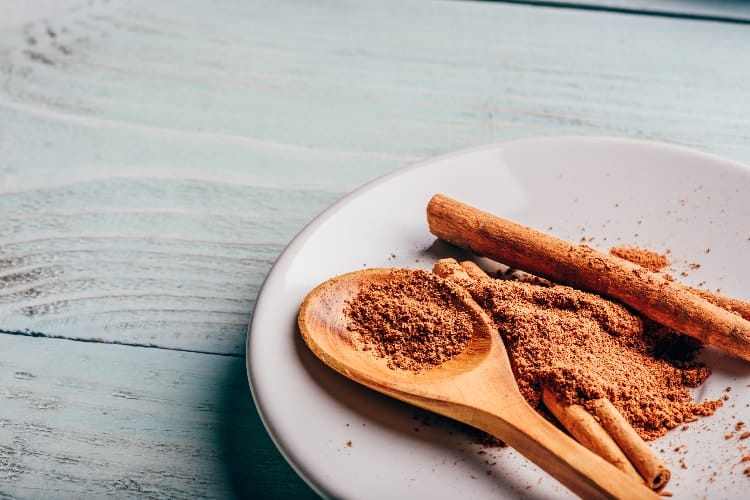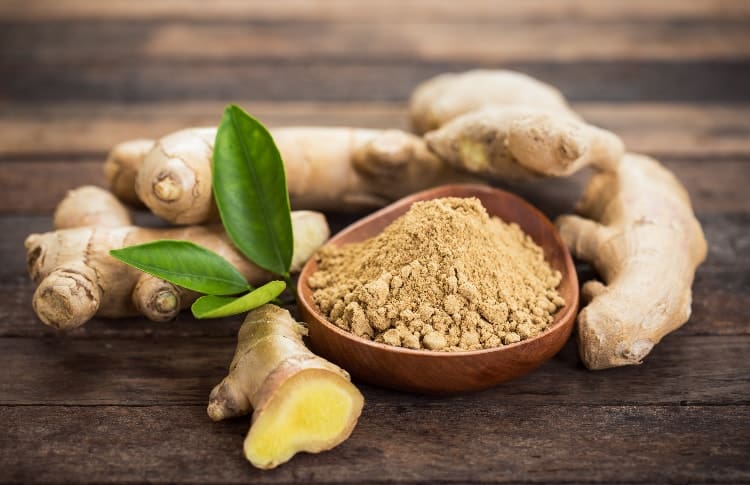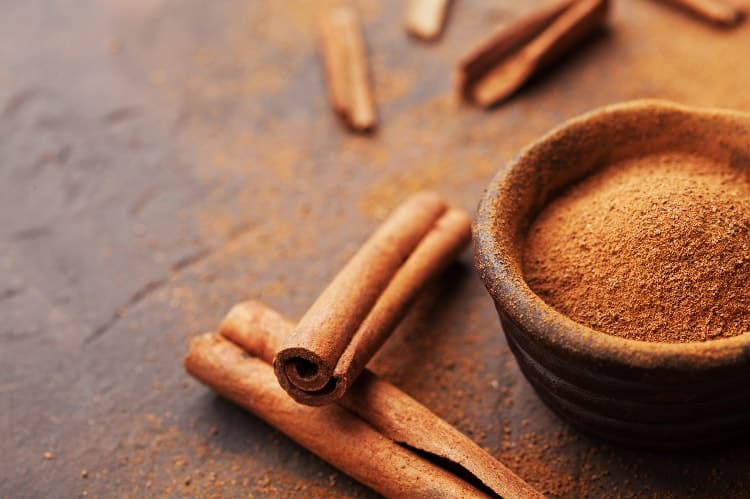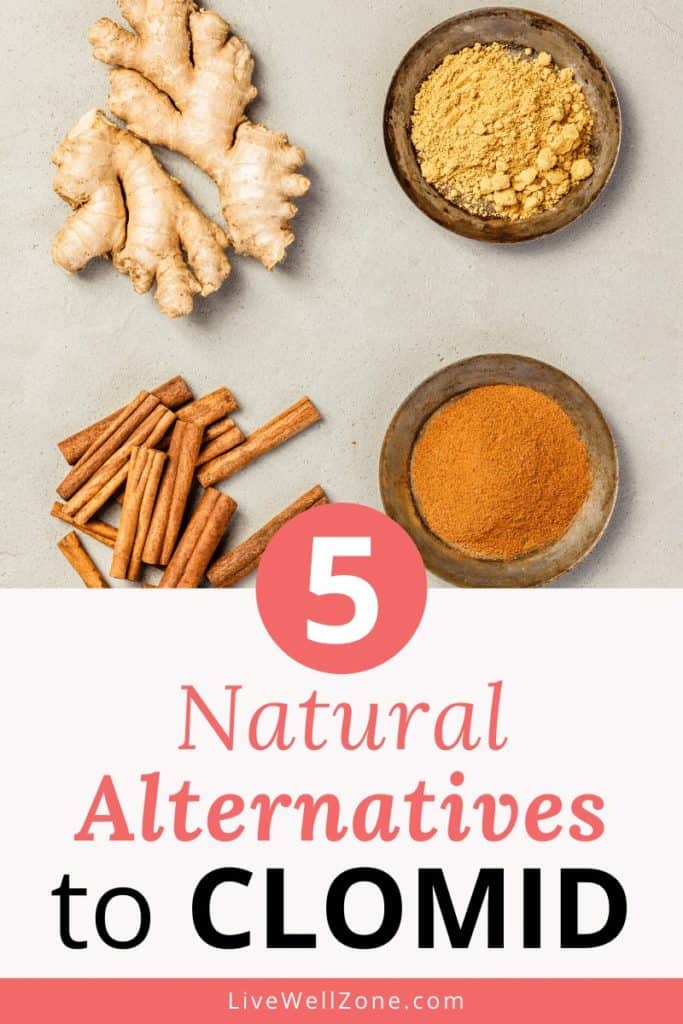
Clomid (aka clomiphene or clomifene) is often used for infertility (be it due to PCOS or something else). While clomid does indeed help with ovulation, you may be wondering if there are natural or herbal alternatives to clomid.
In this article we’re going to look at five herbs that may produce similar effects when it comes to encouraging ovulation.
But before we dive into the main topic, let’s talk about why you might want to support ovulation naturally.
It could be that you prefer to avoid some of the side effects of clomid, which can include (source):
- Abnormal vaginal or uterine bleeding.
- Nausea.
- Enlarged ovaries that cause pelvic/abdominal pain.
- Headaches.
- Diarrhea.
- Shortness of breath.
- Severe gastrointestinal symptoms.
- Decreased urination.
- Bloating.
- Dizziness.
- Flushing (aka hot flashes).
- Tender breasts.
- Upset stomach.
- Blurred vision and vision changes (which can sometimes be permanent).
Secondly, it could be that you’re looking for ways to increase your chances of conceiving. While Clomid has a high success rate for ovulation – about 70-80% – the chances of conceiving are lower (about 30%).
That 30% is certainly nothing to scoff at. But it’s worth noting that it is based on going through several rounds of Clomid (i.e. it’s not a given that it’ll be successful on the very first try).
So, based on all of the above, you might be curious about whether there are options available to you.
That’s exactly what we will look into in this article.
NOTE: this information is for educational purposes only. It’s really important that you discuss these herbs with your healthcare provider. He or she will be able to guide you when it comes to dosage, and whether or not these herbs make sense for your particular situation. Also, there isn’t much information about whether these herbs have a higher success rate than Clomid. So, once again it’s important to speak with your provider and get their feedback.
5 HERBAL ALTERNATIVES TO CLOMID THAT HELP WITH OVULATION AND FERTILITY
1. Ginger

A 2017 study done with PCOS-induced rats studied the effects of clomid and ginger on sex hormones.
The study found that at higher doses (350mg/kg) ginger is as effective as clomid and it’s able to increase LH and estrogen, while decreasing progesterone and FSH.
In fact, the study concluded that since “long-term administration of clomiphene citrate has some side effects, the use of ginger as a herbal medicine without any side effects at high doses can be an effective and good alternative in improving PCOS.”
For more on this topic, I recommend reading this post on how to use ginger for pcos.
It outlines all the ways in which ginger helps with PCOS (such as weight loss, regulating blood sugar and more) plus how to use it.
2. Black Cohosh
Black cohosh is a multi-purpose herb that helps women throughout all phases of their menstrual cycle (from reproductive years through to menopause).
And when it comes to ovulation, research indicates that black cohosh is capable of stimulating ovulation in women with PCOS (source).
So, how does black cohosh do this?
Well it acts on the nervous system.
You see, different parts of the nervous system (such as the hypothalamus and pituitary gland) respond to your natural estrogen.
And by responding to estrogen, those glands release hormones that affect your monthly cycle and ovulation in particular.
Now, it turns out that black cohosh is able to intervene in hormonal processes and regulate the action of the pituitary gland.
This action causes the pituitary to release hormones that stimulate ovulation.
It’s important to note one thing here: even though black cohosh steps into hormonal processes, there are no signs that it causes hormone disruption or interference (source).
Isn’t that beautiful? It’s a welcome change from a world full of hormone disruptors!
3. Cinnamon

Cinnamon is another herb that can act as a natural replacement for clomid.
A 2016 study found that PCOS patients who took a cinnamon supplement had almost twice as many menstrual cycles over a 6-month period (compared to a placebo group).
One reason why cinnamon can help with ovulation is because it’s very effective at regulating insulin levels (which tends to be quite high when you have PCOS).
And as I mentioned in this post on the 7 steps for natural PCOS relief, high insulin can cause the ovaries to:
- make more androgens and less estrogen.
- interferes with ovulation.
- delays egg maturation.
- degrades egg quality.
4. Vitex
There are two main reasons why you’d want to consider using vitex to support ovulation:
- First, vitex regulates elevated prolactin levels.
- Second, it improves luteal phase defect (i.e. a short luteal phase).
ELEVATED PROLACTIN
Prolactin is a hormone produced by the pituitary gland and it plays a role in regulating our monthly cycle.
When prolactin levels are too high, we can end up with irregular periods, fertility difficulties and more.
LUTEAL PHASE DEFECT
A luteal phase defect means you have a short luteal phase (usually less than 10 days).
A combination of low LH (luteinizing hormone) and low progesterone are generally responsible for luteal phase defect.
You see, after ovulation has occurred:
- LH transforms your follicle into something called a corpeus luteum.
- A new corpeus luteum is made during every menstrual cycle and one of its main tasks is to produce progesterone.
- That progesterone is necessary for thickening your uterine lining in preparation for a possible pregnancy.
- If there’s no pregnancy, then the lining sheds and you get your period.
However, if there are issues related to the corpeus luteum (for example, it doesn’t develop properly) then you can end up with insufficient levels of progesterone (source).
And this shortens your luteal phase, making it difficult for pregnancy to occur.
So, how can vitex help?
Well, studies show that vitex can (1, 2):
- lower prolactin levels.
- boost the function of the corpeus luteum.
- regulate LH and progesterone levels.
- improve luteal phase defect.
In addition to all of the above, vitex seems to increase a woman’s chances of getting pregnant.
This was seen in a group of women who had been trying to conceive for 6 – 36 months.
An herbal blend, which had vitex as one of its ingredients, improved hormone levels after 3 months and led to 26% of the women getting pregnant.
(By the way…that herbal blend also contained green tea, L-arginine, vitamins and minerals. This further highlights the importance of using a balanced multivitamin, multi-mineral supplement like the one I recommend in this list of hormone-balancing supplements).
5. Tribulus Terrestris

Tribulus is an herb that is most often used to enhance sexual performance and for boosting testosterone in men.
However, in women tribulus seems to provide hormone-regulating benefits that help with ovulation.
One study done with rats showed that tribulus reduces the number of ovarian cysts, increases the number of follicles and also increases the number of corpora lutea (structures in the ovaries that produce hormones necessary for conception as well as for sustaining a pregnancy).
By increasing the number of follicles, this increases the chances of having a dominant follicle that will eventually release an egg.
RELATED QUESTIONS ABOUT NATURAL CLOMID REPLACEMENTS
What tea is good for fertility?
Green tea can be helpful for fertility because it supports liver function, making it easier for your body to get rid of hormone disruptors.
Nettle leaf tea is also a natural detoxifier and anti-inflammatory tea that you can try.
Can turmeric boost fertility?
Although turmeric isn’t considered a fertility herb, it’s one of the best anti-inflammatory herbs to add to your diet.
Since inflammation is a major underlying cause of hormonal imbalance, turmeric can help you address the root cause and as a result, contribute to healthy fertility.
For more on turmeric I recommend reading this post on the benefits of turmeric for PCOS (and the 4 ways to use it)
Can garlic help one conceive?
Garlic contains sulfur, which the body uses to make glutathione. Glutathione is an antioxidant that the body produces and it’s sometimes called the “master detoxifier” because it binds to toxins and transports them out of the body.
The less toxins you have in your bloodstream, the less inflammation and hormonal issues you experience, which will make it easier to conceive.

CONCLUSION: IS THERE A NATURAL CLOMID?
Ginger, black cohosh, cinnamon, vitex and tribulus terrestris are 5 herbs that might you can use instead of clomid.
Although each herb has its own specific mechanism, the end result is always the same: they help regulate hormones, which in turn supports ovulation.
Whether or not these herbs are suitable for you depends on your particular needs. Therefore, it’s very important to discuss them with your doctor before attempting to use them.
I hope this post has been helpful in giving you some options to explore for natural ovulation.
Related Posts:
Vitex Vs. Clomid for Pregnancy: Pros & Cons, Success Rates, Side Effects and More
Vitex vs Inositol: Benefits | Differences | Which is Better for PCOS and More
Maca Fertility Smoothie: Benefits, Best Type To Use and Recipe Tips
Inositol For PCOS: Pros, Cons and Food Sources
How to Make a Fertility Smoothie For PCOS: A Simple Guide With Recipes
Fertility Diet To Improve Egg Quality Naturally: A Complete Guide with Food List
5 Things You Should Know Before Using Black Cohosh for PCOS And Fertility
A Complete Guide to Using Cinnamon for PCOS: Benefits, Dosage and Recipes
Adaptogens For PCOS: Why You Need Them and Which Ones To Use
Marjoram For PCOS: Tea & Essential Oil Benefits (+ How To Use)
Spearmint Oil And PCOS: Benefits and How To Use It
Cinnamon for Hormone Imbalance: Benefits and Uses
Benefits of High Protein Foods for PCOS and Which Ones You Should Eat



We’re five years into our infertility journey. The feelings of pure bliss that come with the thoughts of one day finding out we’re pregnant instead came with month after month of disappointment. Its just about to the point of becoming apathetic and desensitized to the thought of pregnancy. I recently stumbled into your site and it’s definitely giving me renewed hope.
Love and blessings.
Glad this has provided some renewed hope and wishing you nothing but the best!